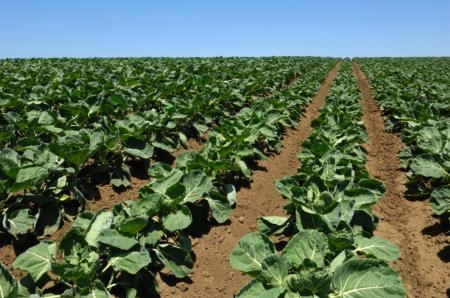
Posts Tagged: spinach
UC Cooperative Extension advisors help spinach growers finesse fertilizer applications

Richard Smith and Michael Cahn, UCCE advisors for Monterey and other Central Coast counties, have been conducting field trials for several years to determine volume data on fertilizer application. Once growers know exactly how much nitrogen their crop is absorbing, they can more precisely apply an appropriate amount.
Smith explained that baby spinach will absorb roughly 80 percent of the nitrogen it is going to take up in the final two weeks before harvest, making timing critical, Taylor reported. Spinach harvested a few days later, called "teen spinach" uses about 100 pounds of nitrogen per acre; larger-leafed spinach can used up to 120 pounds.
“No (previous) studies had evaluated high-density planting of clipped or bunched spinach grown on 80-inch beds,” said UCCE research assistant Aaron Heinrich. “Our study was specifically designed to provide data on the nitrogen uptake characteristics of spinach and to evaluate ways to improve nitrogen fertilizer management.”
Spinach safer five years after E. coli outbreak

UC Berkeley professor appointed to systemwide position
Sybil Lewis, The Daily Californian
UC Berkeley professor Barbara Allen-Diaz has been appointed University of California systemwide vice president for Agriculture and Natural Resources, reports the Daily Californian, the UC Berkeley student newspaper.
UC food safety research on the national news
Last Saturday night, the CBS Evening News aired a six-minute special report on food safety. The research component for the story featured an appearance by UC Davis Cooperative Extension food safety specialist Linda Harris, in which she explained work underway to understand the potential food safety impact of irrigation practices on leafy green vegetables.
Reporter Bill Witaker noted that cutting edge research is being conducted around the country to find out how pathogens make it onto fresh produce and how to reduce the risk. He used the UC Davis Center for Produce Safety as a case in point.
Interviewed inside her lab, Harris told Whitaker the effectiveness of her work is "hard to prove, it's hard to measure, but I really think we do make a difference."
UC research isn't confined to laboratories. Three UC Cooperative Extension farm advisors in Monterey County - Steve Koike, Richard Smith and Michael Cahn - are working with campus-based researchers to determine the ability of the deadly E. coli 0157:H7 to survive in the field.
They reported in UC Delivers that they used harmless E. coli as surrogate organisms to evaluate how variations in soil moisture and environmental conditions impact the organism's survival in soil, water and on plant surfaces. In addition, experiments on E. coli source-tracking, detection technologies and field ecology are being conducted to gather information from an environment that reflects the actual farming conditions of the local agricultural industry.

UC scientists are helping protect the safety of the U.S. food supply.